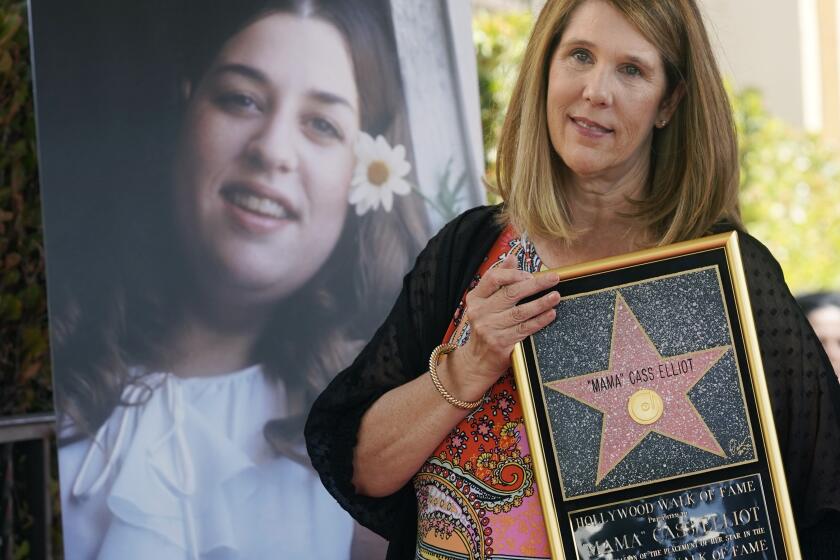UNIVERSAL FIGHTS BACK AGAINST BOGDANOVICH
Universal Pictures, stung by repeated attacks from director Peter Bogdanovich over the version of “Mask” released by the studio, has decided to fight back.
The studio asked Friday that the dispute be aired before the Professional Standards Committee of the Directors Guild of America. Universal Chairman Frank Price alleged to the committee that Bogdanovich’s “actions and public statements” are outside the guild’s “standards of professionalism.”
Price and “Mask” producer Martin Starger released an eight-page point-by-point denial of Bogdanovich’s allegations Monday. In an interview at Universal, the pair said that they were particularly distressed by a letter supporting Bogdanovich and bearing the names of several prominent directors, including Woody Allen, John Huston and Mel Brooks.
“Rather than go and talk to every director from A to Z to state our position, we felt the proper way was to go to their organization,” Starger said.
Bogdanovich last month launched a public crusade against Universal, complaining that 10 minutes of Bruce Springsteen songs had been replaced by Bob Seger songs behind his back and that two key scenes had been deleted. He filed suit against Price and Starger, alleging that they had violated his contractual rights to “final cut” and damaged the movie.
Universal kept a stony silence, concerned that the dispute might hurt the film’s opening. But “Mask” debuted to big grosses in three cities March 8; if anything, the controversy helped business. With Bogdanovich continuing his attacks and the film scheduled to open wide Friday, Universal chose to speak out.
According to Price and Starger, Bogdanovich was repeatedly told that because of a “disagreement over videocassette rights,” Springsteen’s music was far too expensive for the film’s music budget of $226,000. Bogdanovich refused to consider any alternative, according to the pair, forcing Starger to substitute Seger in December without Bogdanovich’s participation. Starger and Price stressed that “Mask” is not a musical but a drama with background music by numerous artists.
The pair also challenge the notion that the real-life Rocky Dennis, “Mask’s” ill-fated deformed hero, was a Springsteen fan.
Contrary to statements by Bogdanovich and Rusty Mason, Rocky’s mother, Universal claims that Springsteen was never mentioned in the extensive research or interviews conducted by screenwriter Anna Hamilton Phelan. Phelan confirmed that assertion by phone Monday, saying that Rocky’s favorite bands were, to her knowledge, the Beatles and Black Sabbath.
As for the two “deleted” scenes, Price and Starger claim that “many of Bogdanovich’s cutting rights” were conditioned upon a maximum running time of 115 minutes. When he violated that length (by 9 minutes) and refused to compromise, cuts were made, according to Price and Starger.
A campfire musical number focusing on Cher was deleted because the studio feared that the scene would “interfere with the credibility of the picture” in light of Cher’s “previous career as the star of a musical variety television series.” Price and Starger add that when “test screenings” of the film were held in accordance with Bogdanovich’s contract, audiences preferred the film without the campfire scene.
Bogdanovich, reached on vacation in Canada, reiterated that he was entitled to “paid previews” with “random audiences,” not “recruited” previews held at Universal. He said he was repeatedly told that neither the contractual length of the film nor its musical budget was “absolute” if “considerations of quality” dictated otherwise.
Bogdanovich, who was introduced to Springsteen’s music through his former girlfriend, the late Dorothy Stratten, is still adamant about reinstating the Springsteen songs. He claimed that Universal would only have to pay for “editorial services and new prints” under new concessions he has obtained from Springsteen and CBS Records. As for Universal’s appeal to the Directors Guild: “I am open to any arbitration that is fair.”
ISRAELI DIRECTOR: The biggest logistical problem for most Oscar nominees is finding extra tickets for friends. Uri Barbash had to get out of the army.
Barbash, director of Israel’s best foreign-language film nominee, “Beyond the Walls,” was due to perform his annual six-week military stint last fall. It was postponed so that he could attend the Venice Film Festival, where his film won the Critic’s Prize.
Barbash’s rescheduled military service fell during the Oscars, forcing him to ask for a second postponement. The authorities were dubious, he recalled in a lunch interview, until the Israeli parliament made an unprecedented request for a screening of the film in December.
“Beyond the Walls,” the story of Jewish and Arab convicts banding together in a corrupt Israeli prison, has gone on to become the most successful native film in Israeli history. It is also the most controversial, especially with radical conservatives led by Rabbi Meir Kahane (“I am proud to be attacked by Rabbi Kahane,” the usually low-key director said).
Barbash said that the film has drawn uniformly good reviews from Jewish organizations in America, where it is being distributed by Warner Bros. He’s planning a new film set in another embattled country--South Africa--and hoping that his military postponement will be justified by an Oscar.
“It’s like the Olympic gold,” he said with a smile. “We cannot go home to Israel without it.”
TRIVIAL PURSUITS: Last week’s item on the “See You Next Wednesday” movie gag running through John Landis’ films drew a deluge of responses.
Many pointed out that Landis’ 1972 debut film “Shlock!” began with an announcement something as follows: “First, ‘Birth of a Nation,’ then ‘Gone With the Wind’ . . . ‘2001: A Space Odyssey’ . . . ‘See You Next Wednesday’ . . . and now, ‘Shlock!’ ”
In an interview in Twilight Zone Magazine, Landis identified “SYNW” as the title of his first screenplay, adding: “I keep including references to that because, basically, I’ve been cannibalizing it for years.”
Several Landis scholars pointed out that “SYNW” was the tag line on coming attractions trailers when movies opened on Wednesdays. Others observed that “SYNW” was the sign-off line in a video dialogue between an astronaut and his parents in “2001,” a Landis favorite. Agent Mike Marcus, who reached Landis last week in Norway (where he’s directing “Spies Like Us”), said the director repeated his first-script explanation and offered no other clues.
More to Read
The biggest entertainment stories
Get our big stories about Hollywood, film, television, music, arts, culture and more right in your inbox as soon as they publish.
You may occasionally receive promotional content from the Los Angeles Times.






